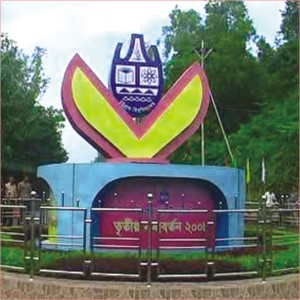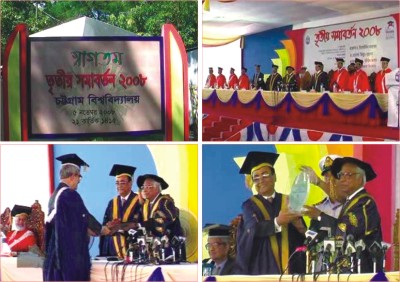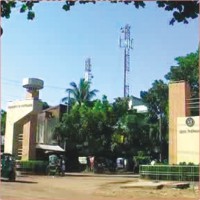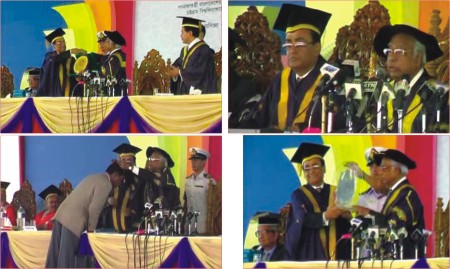|  Spotlight Spotlight
Chittagong University
3rd Convocation

It was a different day for some of the former students of University of Chittagong (CU). Mostafa Obayedullah Chowdhury, Ataul Gani Shuman, Sayema Alam and Tania Tasrin were ecstatic, after having to wait for it for a long time. “We are really happy today. Even after a long delay, finally the convocation is being held. It seems like we are back in our old, golden days of university life”, said these students, who, like many others, expressed their joys on the eve of the convocation.
After the second convocation in 1999, the much-awaited 3rd convocation of CU was held on the 5th November 2008 at the Central Play Ground of CU. The convocation formally kicked off at 10:30 a.m. with the convocation procession attended by Honourable President and Chancellor of CU Professor Dr. Iajuddin Ahmed, Education and Commerce Adviser Dr. Hossain Zillur Rahman, CU Vice-Chancellor (VC) Professor M Badiul Alam, eminent scientist and Professor Emeritus Dr. Jamal Nazrul Islam, Members of the Senate, Syndicate and Academic Council of CU as well as a large number of degree holders among others. The procession started from Faculty of Law of CU and ended at the CU Central Play Ground. After the National Anthem followed by the recitation from the Holy Quran, President Professor Dr. Iajuddin Ahmed declared the inauguration of the convocation.

Right after the President's declaration of the opening of the convocation, Dr. Jamal Nazrul Islam was honoured with a DSc degree. Soon after that, among the degree holders of 1995 to 2003, a total of 879 masters, honors, LLB, LLM and DVM graduates as well as PhD, MPhil and MS (Medicine) degree holders from 1995 to 2007 were given the certificates along with 5 Chancellor Gold Medalists who were awarded for winning positions in the “Chancellor Gold Medal Essay Competition”. The three PhD holders were Mohammad Nazrul Haque Chowdhury, Kuntal Barua and Partha Prateem Dhar while the five gold medalists were Shihab Uddin, Salauddin Kader, Mohammad Habibullah Hawladar, Shawkat Imran Arafat and Moazzem Hossain.
 Speaking on the convocation ceremony, the President said that universities are the breeding grounds of intellectuality, research, ingenuity and knowledge sharing centre of excellences which in one hand contain the principles and values of the society and on the other addresses the expectations and aspirations of a nation. He said the practice of enlightened thoughts is the driving force for a university and obstruction to this would cause activities of the university come to a dead end. So, he emphasized the need for maintaining congenial academic atmosphere at the educational institutions with highest priority. Speaking on the convocation ceremony, the President said that universities are the breeding grounds of intellectuality, research, ingenuity and knowledge sharing centre of excellences which in one hand contain the principles and values of the society and on the other addresses the expectations and aspirations of a nation. He said the practice of enlightened thoughts is the driving force for a university and obstruction to this would cause activities of the university come to a dead end. So, he emphasized the need for maintaining congenial academic atmosphere at the educational institutions with highest priority.
He said it is the main task of a university to keep the avenues open to help the students share their creative ideas permeated with the spirit of internationalism. “The curriculum, subject assortment and field of research of the universities should be made in such a way so that they are able to fulfill the anticipation of the nation,” he added.

The President suggested the faculty members to act as the missionaries of knowledge, spirit and beauty. “You're the mentors of the intellectuals who become the leader of society and you're also to guide the nation in obscurity,” he observed. He hoped that the CU in the light of its old tradition would continue to play due roles in the field of research and knowledge dissemination. He congratulated the graduates who received certificates and hoped that they would engage themselves in the wellbeing of the nation and mankind as a whole in the line and light of lesson and knowledge acquired from the university. He asked the graduates not to let their achievements become 'certificate only' event but to make it significant for encroachment in their respective fields.
 The President assured to ask the ministries and departments concerned to address the problems of the university within the shortest possible time. The President assured to ask the ministries and departments concerned to address the problems of the university within the shortest possible time.
Education and Commerce Adviser Dr. Hossain Zillur Rahman was present as the special guest of the event, Dr. Jamal Nazrul Islam was the convocation speaker while the VC of CU Professor M Badiul Alam spoke about highlighting prospects and problems of the university.
Education Adviser said that the country's education system had been operating with many encumbrances in it and it was high time to address the obstacles for the welfare of the nation. He said the qualitative standard of higher education in the country is being questioned though education augmented in quantity.
“Instead of being fields for practicing global knowledge, and holding colloquiums, symposiums, workshops, discussions and researches, many of the universities have now appeared as the centres for distributing certificates” he lamented. He accentuated on learning ethics together with the applied subjects what had long been absent in the country's education system. Dr. Islam underlined the need for communal effort in attaining the international standard of education.
“Qualitative delivery of education had mostly been dependent on qualified and able faculties”, he said. He suggested total refurbishment of the existing teacher hiring system and demanded new conscription system where only the qualified people would get the entry. Professor Islam further added that an updated curriculum, modern teaching system and well-controlled academic calendar are the main things to ensure qualitative education.

In his speech the VC of CU Professor Dr. M Badiul Alam mentioned that university is the highest institution to turn the mass population into human resources. The main responsibilities of a university includes not only preparing the students for the upcoming challenges of life but also making them realize their duties toward mankind through education, ethics and upholding the culture.
“I firmly believe that university is the ultimate place to flourish the multi-dimensional talents of the students through different academic and extra-academic activities and to do so CU is working hard to create an environment to ensure the nurturing unfettered intellect of the students, supporting the cultural activities, ensuring proper discipline and eradicating the session jams”, he added.
Before the Chancellor pronounced the end of the convocation, the Chancellor and the Vice-Chancellor exchanged crests as a token of appreciation. CU's Assistant Professor Mohammad Giyasuddin Talukdar of Department of Arabic and Farsi recited from Quran whereas Associate Professor Shukanta Bhattacharya of Department of English and Assistant Professor Sadaf Noor-E-Islam of Department of Anthropology hosted the event.

 “I want to make the convocation regular, not occasional” “I want to make the convocation regular, not occasional”
Professor Dr. M Badiul Alam
The Grand Port City of Chittagong, once called the Porte Grande by the Portuguese sailor-merchants in Bangladesh did not have a public university for long to meet the higher educational needs of the students of Chittagong division. There was a growing demand for a public university among the people of this region in which various modern academic disciplines would be set up in order to develop skilled and erudite human resources. Thus on November 18, 1966, the University of Chittagong (CU) was inaugurated. Located at Fatehpur, Hathazari, it is 22 km. away from the Chittagong city and about one km. away to the west from Chittagong-Nazirhat highway. Since its inception, it has come a long way with so many ups and downs as well as glories and achievements. Recently, CU celebrated its 3rd convocation. On the occasion of the convocation, Star Campus (SC) spoke to the Vice-Chancellor (VC) of this institution Professor Dr. M Badiul Alam about the different aspects of CU.
SC: This year's convocation took place after many years. What do you think are the reasons for the delay?
VC: Well, after more than eight years finally the long expected 3rd convocation of CU was held. I know that for a university which started its journey in the year 1966, holding only three convocations are far from enough and that too after huge gaps in between. This time I wanted to take up the challenge, I wanted to hold the convocation, I wanted to rebuild the image of CU by organising the convocation just as other universities do. I am happy that I got all sorts of support and co-operation from every corner to make this grand event happen. Actually it's all about becoming aware about the desires of the students who always dream of taking their certificates in the colourful atmosphere of the convocation ceremonies.
SC: Do you have plans to organise the event every year from here on?
VC: Yes, of course I want to hold convocation every year. In fact, it's quite unusual in comparison to other parts of the world that most of the public universities in Bangladesh fail to hold the convocation on a regular basis. In my tenure I want to establish that example, I want to make the convocation a regular feature, not occasional.
SC: CU is known for prolonged session jams. What initiatives do you plan to take to stop this trend to smoothen the education timetable in this institution?
VC: The session jams were in an alarming state when I took up the charge of VC in 2006. It became my chief agenda to curtail session jams. I gave the utmost priority on it and identified the causes behind this problem. Among many others the main reasons I found responsible for session jams were that classes did not take places timely, courses were not completed in due time, exams were not held on time and results were not published on time. To solve this problem I've introduced academic calendar, academic ordinance as well as examination ordinance. Previously, students who did not complete their graduation within six years could sit for the exams on special considerations but by introducing the examination ordinance I totally abolished this bad practice. According to these ordinances, every student must complete their graduation within six years.
SC: Many think that the standard of education at CU is deteriorating and as a result they opt for other public and private universities. How would you evaluate this situation?
VC: I don't agree with this at all. Last year there were around 90,000 candidates who sat for admission tests in CU, in 2006 it was around 70,000 and this year it's more than 1,11,000. It implies that the standard of education at CU is not deteriorating rather more and more students are becoming interested to pursue their higher studies at CU. This is because CU is becoming more advanced both academically and systematically. The overall education system is improving day by day. The unnecessary holidays are not there anymore. And we are regularly revising the existing syllabuses, introducing newer subjects and departments to impart better higher education. In line with that this year we have introduced Institute of Modern Languages under the Faculty of Arts where we have certificate courses on French, German, and Arabic etc.
SC: It's an open secret that some influential teachers give more emphasis on taking high-pay classes at private universities during their scheduled class hours at CU which is also another reason for session jam. What's your opinion about this?
VC: Actually not only the influential teachers, it is true that now-a-days most of the teachers of the public universities are becoming more and more interested to join private universities and most importantly, the private universities became even more interested to appoint the talented faculty members of public universities. But it's not the teachers' or the private universities' fault at all. It's happening because the pay scales of the faculties of the public universities are unbelievably low. I raised this issue several times in the VCs' meetings at the University Grant Commission (UGC). The pay scales of the public university teachers in Bangladesh are surprisingly low in comparison with that of the other South Asian countries, let alone other developed countries. Public university teachers should have separate pay scale in accordance with time. Government should come forward to stop brain drain from the public universities.
SC: Another thing that weakened CU's image in cultural arena as well as among other universities is that CU's cultural organizations mostly face strong obstacles from some “political powerhouses” because of which any dance or drama festivals or band shows even for a good cause hardly takes place at campus. What's your administration doing to stop this situation?
VC: I don't really agree on this point. Because without cultural activities a society cannot be developed and that's why I always support culture based education. This year we celebrated “Nazrul Jayanti”, “Pahela Boishakh” as well as other cultural functions of different cultural organizations at CU. Our cultural organizations have prominence around the country for their performances, quality and high standard. I'm trying to establish a culture sensitive education system. In fact we have a plan to organize “Cultural Week” in early next year where there will be dramas, dances, recitation, music etc as well as competitions in these fields.
SC: Thank you sir for your time and for sharing your ideas with us.
VC: My pleasure. I would also like to thank Star Campus and its readers and wish them all the very best. I really appreciate the policies of Star Campus which encourages young, upcoming writers and give them a platform to share their thoughts. I would appreciate more stories in SC which will bring out the real problems in different educational institutions those subsist. I think SC can take up an initiative through which academics, students as well as other professionals can discuss various problems, especially those related to academic institutions. It can introduce a new section where these people can debate about different issues to come up with a better solution to make Bangladesh a better place to live in. And I believe that this type of initiatives will bridge the gaps between the teachers, students and government.
(Interview taken by Tabassum Mokhduma)
Chittagong University at a glance...
· University of Chittagong was first established in the mid-sixties.
· It is located at Fatehpur, 22 km. away from the Chittagong city and about one kilometre away to the west from Chittagong-Nazirhat highway.
· University of Chittagong offers undergraduate, graduate & postgraduate education and research facilities in different disciplines.
· CU has four research centres: Research Centre for Mathematical and Physical Sciences, Nazrul Research Centre, Bureau of Business Research and Social Science Research Institute
· Since inception of this University in 1966, about 2,43,585 students have completed their undergraduate, masters and higher-degree programmes
· The campus is stretched over 1300 acres of land decked with hills and dales' lakes and ponds and stunningly green tall trees.
· More than seventeen thousand full-time students are enrolled in the University. Of these, three thousand five hundred students reside in nine student halls and one hostel.
· Dormitories for female students can cater to most of the female students' accommodation needs.
Copyright
(R) thedailystar.net 2008 |

